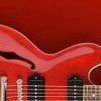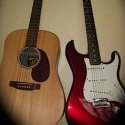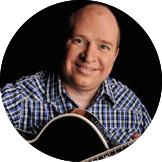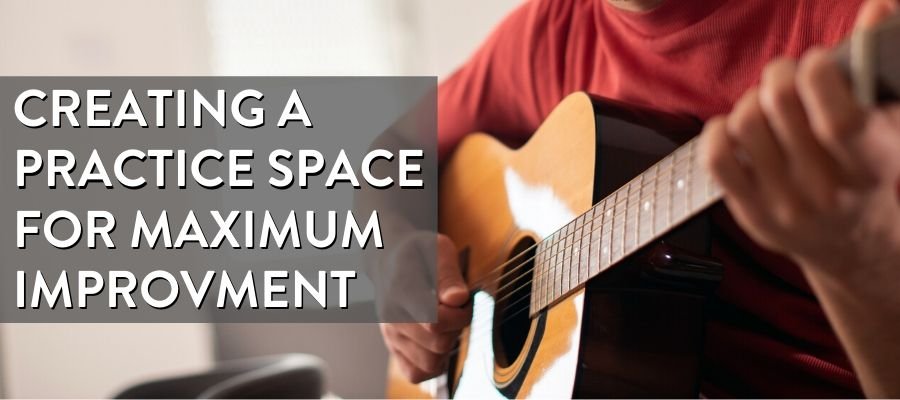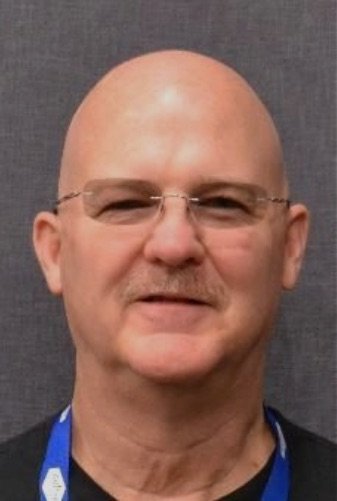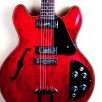Leaderboard
Popular Content
Showing content with the highest reputation on 02/06/2020 in all areas
-
5 points
-
How Steve Krenz came about Teaching What made you want to learn guitar? My mom was the one that made me pick up the guitar. No one in my family was musical at all. I had no friends at that time that I knew were musical. But, mom wanted a guitar player and I was forced to take lessons. I was neither interested in it at the time nor asked my mom to let me try it. I started guitar lessons at a local music store in the mall when I was 6 years old. This continued on for years. Friday night guitar lessons then eating out with the family at a nearby restaurant was our weekly pattern. Every day I practiced while the supper dishes were being done. At the end of every supper my dad would say "Get your Guitar" or more accurately, "Git Yer, Gitcher". And I would practice for about 20 minutes or so while the dishes were being done. I still have some of the old lesson books with water stains on them from being set on the freshly wiped table every night. At times I begged to quit never understanding what this guitar playing had anything to do with my life or future. My teacher thought I had potential and that was all that my folks needed to keep up the lessons. Week after week, year after year, lugging my guitar around, my parents paying for all those lessons. My teacher was a gruff Italian man Johnny Frisco who smoked like a smokestack. He was a local jazz player and I have only recently realized and appreciated all that he poured into me as a disinterested kid. He taught me how to read music. I never even saw Tablature and didn't even know what it was until many, many years later. Every week he would write out on music paper the song I was supposed to learn. I have looked back through my old lessons and realized that I was playing pretty complex chord melody jazz pieces by the time I was 9 and 10. He never indicated to me that I was any bit more advanced than any of his other students. And truthfully it never even occurred to me that I had any unique aptitude for the guitar until I was in high school. I was never the least bit interested in playing guitar until 6th grade when a friend of mine said that I could play guitar in the band at school in this special band called a Jazz band. He only came for the first practice with me. He never came again and I never stopped coming. I remained active in the Jazz ensemble at whatever school I was at until the day I graduated from college. I have often thought how my life would have been so totally different had he not invited me to be in Jazz band that day. Much to my utter astonishment by the time I was 16, I was the top high school jazz guitarist in the state of Texas. Now, many years later, I have played and taught guitar here in Nashville (Music City USA) for 5 years; providing for my family, playing music, recording, and speaking. I am by no means the best guitarist here. There are players that can play circles around me but I feel a wonderful sense of accomplishment that I have been able to hold my own musically in what is arguably one of the most competitive musical environments on the planet. My parents gave me lessons even though at times I begged to quit. They invested their time and money week after week into me so that I could have a life filled with music. I will be forever grateful that they didn't let me quit when I complained. I am reaping now what was sowed into me by my parents. I have played guitar on almost every continent and now I have the incredible opportunity to help people like you in learning the guitar from all over the world. I am truly amazed and humbled by it all and I count myself a very blessed man. OK, now on to your next question... How did Learn and Master Guitar come to be? Well, let me back up a bit. In 2000, me, my wife and our three young boys were in San Antonio, Texas. I was the Music Director at our church there and enjoyed the blessings of steady paychecks, provided health insurance and great favor with everyone. We were very comfortable except for this nagging idea in the back of my head that I had had since high-school that I needed to be in Nashville playing guitar. Eventually, after lots of soul searching and prodding from my wife, it was time to make our feelings known. Needless to say, it was not received well by my family or the church. I distinctly remember telling the pastor (who was in many ways a father to me) that I wanted to go to Nashville to play and teach guitar. I remember his words "Why would you want to go to Nashville and sit in a little room and teach people how to play? I just can't see you being happy like that." He was, after all, correct. I had a great job and I was getting ready to move not just me but our whole family to a completely new place with the only guarantee of work was one lady at a small music school in Murfreesboro, Tennessee who said when I was passing my resume out trying to get work "Well, when you get to town give me a call." That was all that we needed. I put a deposit on a house in Nashville, we put the house up for sale in Texas, said our goodbyes, cried our tears and moved in July of 2001. For the next 4 years or so, I did just what my pastor had said, taught guitar in little rooms in various music stores to mostly dis-interested teenagers and kids and an occasional adult and entered the often frightening world of the self-employed. As finances got tighter and tighter I wondered if I had missed it by this whole "thinking I was a guitar player" thing and now me and my family were paying the heavy price. It was in the midst of that very low point that after coming home from another less than profitable, frustrating day that my wife said that a guy had called about guitar lessons. After a day or so I called him back. He said he was interviewing guitar instructors for a video project that he was doing. He had gotten my name from a mutual friend who lived up the street. So, we met for lunch and he laid out his idea and asked if I could do video. I had never done any video but I said "Sure, I can do a video." He asked if I could write a book to go with it. Having never done anything like that I confidently said "Sure, I can do the book. No problem" He said thanks, paid for my lunch, and said that he was going to interview some more people. I never heard from him for about a month and had truly forgotten about the whole thing when he called back and said "Steve, I think you're my guy." (I found out later that there he had actually picked another instructor who left them high and dry on the first day of shooting.) This was about November of 2005. Neither of us had any idea the amount of work that was ahead of us. He thought he would have a guitar course by Christmas and I thought I would get some Christmas money. I got my materials together and put together a course based on what I had seen work in my private teaching and what I actually used in my own professional playing, and I tried to avoid the peripheral nonsense that had frustrated me by other teaching materials and just stick to the basics - the "meat" of playing guitar. After a few weeks of me getting some ideas together we started filming the day after Thanksgiving. I must admit at that time of financial hardship, there was no lofty educational visions of grandeur in my mind. It was strictly just another means to pay the mortgage for my family. (You men who are head of households know what I mean. Sometimes, when times get tough your preferences and desires get trumped by your responsibility to provide.) If there was a check at the end of this then "Sure, I can do a video guitar course. Where's the camera." So, we went to a friend of his who did some video and had a home studio. We recorded about 3 or 4 sessions at a time - mostly on weekends and occasional very late weeknights. There was just the three of us at that time. If you would have turned the camera around you would have seen a music stand with my notes on it, the man who hired me sitting on a sofa checking his email, the video guy running one of three cameras that were used bored to death, my guitar cases and gear strewn about the room, and two chinchillas in the next room that slept during the day but became quite noisy and active during the late night hours that we filmed. I remember having to wait to film one time because the next door neighbor was mowing his lawn. What about the funky blue lights and the candles in the (original Learn & Master Guitar) video? The set was the video guys idea and his gear. The candles, which now seem so dated, were supposed to be hip and cozy and comfortable. The blue lights were borrowed from a nearby university and came off too strong on camera later but it was not a big enough deal at that time to try to do any better. We couldn't have the heater on when we filmed because of the noise, so I remember it being burning under the lights and freezing when we weren't filming. As the long hours and late night video sessions continued through the Christmas season the anxiety of keeping up with them (as well as my normal day teaching schedule) increased as well, until finally we recorded the last three sessions the day before Christmas. And I was sick as a dog. I remember sitting in front of one of those notorious blue lights before the taping of the last session just trying to get warm and thinking that there was no way I could do another session. But I knew I needed to finish, I knew there was a check at the end of all of this, so I splashed some warm water on my face and just gritted through the last session. If you look closely on Session 20, you can see in my eyes that I was sick. After it was done well after midnight, I went home utterly exhausted and was sick for several days. Towards the end of January, I had enough stamina to jump back on the horse again and work on writing the book. Once we started getting the rough video edits back to look at, it became clear that lots of editing were needed. I decided to add musical graphics so that the student could just look at the screen and see the music instead of constantly referring to the book. That decision alone added months to the time line. Every graphic you see, every note, every dot, every finger number was painstakingly created by me to be put in the video and in turn in the book. Every second of when that graphic was to appear, what it was to be called, and when it was going to leave was meticulously notated by me and emailed to the video guy who put them in, emailed them back to me and we went through the cycle again. There are probably close to 1000 musical graphics during the 20 sessions that had to be created, refined, put in the book and put in the video. It was grueling, every waking moment, sun-up to sun-down work (while still keeping all of my other teaching and playing going). Easily, the hardest thing I had ever done. And it went on week after week for months. I, and the man who hired me, thought it would never end. But, mercifully, sometime in May 2006 the process was done. I was glad to have this incredibly difficult project through with and was glad to have it in my rear view mirror. In July or so, it had been manufactured and I remember picking up the first few copies. Wow, I had my name on something. Pretty cool. Then, I was off to play and teach some more. Then, 1 or 2 a day sold, then 10 a day, then more. Now thousands have gone out. I would have never guessed how my life has changed since those late cold nights of filming and how many have been helped to become better musicians through some simple concepts of guitar playing that were given. And how through their learning that it would bring so much to their lives and mine. Eventually, I quit the private teaching to come on and help Legacy Learning Systems to further develop Learn and Master Guitar and other projects (while still continuing to play guitar and speak at conferences). Are you the owner of Legacy Learning Systems? I am not the owner of Legacy Learning Systems. It is owned by the wonderful man who I had lunch with that fateful first day and who I have come to respect and care for. Now we work together with several other very talented people to try to put out resources that people can truly learn from. It is a solemn privilege that keeps me motivated as I go, even today, to edit some session of Drums and ask myself the question "Well, who would really know if I didn't put this example on the screen or if I missed a few notes here and there." The knowledge of all of those, yet unseen, that may get helped by it someday helps me to say "Let's go back and fix that one spot one more time, I think I can make that example easier to understand." I was conducting a guitar class for this conference just last week and was asked "Don't you have a guitar video?" I had forgotten to mention it to the class and thought how great it was that I now have a good resource that I can recommend to people who want to learn how to play. All in all, I'm still just a very blessed and grateful guitar player who was up early this morning working on scales (thinking that my chops have gotten sluggish since I have been doing all of this desk work) and looking outside thinking that I need to mow the yard tonight. Wow, this is getting too long. If anyone is still reading by this point and haven't fallen asleep, you should get a prize or something. I will try to answer some more later. Suffice it to say, I love my job - teaching guitar, playing guitar, interacting with you wonderful people, creating quality resources so that people can learn. I like coming to work.1 point
-
1 point
-
Ahhh… your practice space – the place where learning gets done. You can dread and avoid your practice room like a prison... Or you can savor your time there as a sanctuary away from the demands of life – a refuge to get away from the stresses of the day and focus on what YOU want to do and be. Make the physical environment around you as helpful as possible in helping you become a better musician. Let’s learn what items should be around to help you learn. Music Stand A solid place to hold all of your learning materials. Get a good, solid, metal stand. Avoid the inexpensive, fold up portable wire ones which can’t hold much weight and will inevitably bend and break when you trip over them. For day-to-day use in one location, get a solid metal stand like this... MUSIC STAND. If you need something portable to get to jam sessions or other playing situations, here is the best portable music stand I’ve found... PORTABLE MUSIC STAND Metronome The best tool for measuring and improving your rhythm. There are many options for metronomes from a basic “tick-tock” type to those sounding complex multi meters. All you need is a basic metronome. (More is not better when talking metronomes.) Avoid the ones that give a “beep” sound and choose one that gives a “tock” sound. For a good mechanical metronome, this one works great… METRONOME You can also get a metronome app for your phone. My favorite is… METRONOME APP Guitar Stand The safest place for your guitar to be when not in a case. Don’t lean your guitar up against a couch or chair where it can easily be knocked over. Use a quality guitar stand to hold your instrument secure. A good choice is the Hercules stand that locks your guitar when it is in the stand… HERCULES GUITAR STAND You can also hang your guitar on the wall with a wall hanger. Hanging your guitar on the wall is a great way to have your guitar close by and also to appreciate how cool it looks. A good wall hanger is… WALL MOUNTED GUITAR HANGER Comfortable Chair Use a stool or chair that is comfortable. Avoid practicing hunched over on a couch. Find a comfortable padded stool or chair (without arms) so that you can practice for a length of time without getting sore or stiff. Pencil Don’t write in ink unless you never plan on making a mistake. Make sure to have plenty of pencils around. (Avoid using pen.) When something is important to remember then write it down. Writing things down increases your retention of the material. Notebook/Tablet/Paper Keep a practice journal of things you work on. Things that aren’t written down are easily forgotten. Start a practice journal. Write down new chords learned and new concepts. Write down your progress in learning technique. Review your notes often to see how far you’ve come. Ipad/Smart Phone There’s a world of knowledge only a few clicks away. Nowadays, you can easily find a video on anything you would like to learn. Have an ipad close by – maybe even one that can sync to a wall-mounted TV – to pull up a helpful YouTube video or jam track. But be careful, it’s easy to get distracted and start watching videos instead of practicing. Use your practice space ipad for learning – not surfing. Practicing Tip: If you want to practice soloing, record yourself playing the chord changes into your phone and then practice soloing over your track. One Final Thought... Motivation Mission Statement Write out your goals on guitar and put on your music stand. Take a moment and write out your goals or dreams for your guitar learning. In one or two sentences, create your guitar learning mission statement. Once you have the wording like you want it, then print it out and post it on your music stand. It will serve as a quick reminder of why you want to play. Update it often. Creating an inviting practice space can lead to more productive practice times and greater improvement. What are some ideas that you've found helpful in your practice space? Let us know below in the comments. I hope these ideas help you create a practice space that works for you. Learn all you can! - Steve1 point
-
@Randy120 Good point Randy. While striving for perfection, we can lose track of what we've accomplished so far. The added stress we put on ourselves can block our creativity. So in those times it's best to take a step back and refocus. After all, learning guitar is for most of us a (passionate) hobby, and it's supposed to be fun! N1 point
-
Robbie has some good ideas. I like his practice with intent and don't be too critical of yourself philosophy. Strive to improve, but don't imagine you can eliminate all mistakes.1 point
-
1 point
-
1 point
-
@SteveT Remember that YouTube is full of wannabe guitar teachers, and contradictory and misleading advice is easily found. Steve K is a professional educator (and professor of music).. Stick to the advice in his course; you won't go wrong there. N1 point
-
BEFORE YOU EVEN BEGIN THE COURSE 1) Get your guitar setup. Learning guitar is hard enough without have to fight to play an instrument that is fighting you back. Take your guitar down to the local music store and have them do a guitar setup, adjust the instrument properly, and change the strings. 2) Print out the Bonus Resources Book and have it spiral bound. Take the Bonus Resources book PDF down to your local copy place and have them print it out, black & white, double sided, spiral bound, with a clear plastic cover on the front and a black one on the back. 3) Consider getting a music stand, guitar stand, and a metronome. These are going to be of immeasurable assistance down the road. I recommend getting something like this MUSIC STAND and this GUITAR STAND and this METRONOME. (There are plenty of other great ones, these are just some recommendations.) 4) Find a place to practice. A corner of a room - something that is far away from distractions. WHEN YOU BEGIN A NEW SESSION 1) Before you watch the new session, take a look at the new material in the book. Get an idea of what you are going to be learning and what is going to be asked of you. 2) Watch the teaching portion of the session and go through the workshop with the session as best as you can. Stop or backup the DVD when you need to. The goal at this point is to really understand what I'm asking you to learn on the guitar. The out-working of that will take some time but make sure you understand clearly what you are needing to do. (You've got to understand the target you are trying to hit.) Don't worry about not being able to keep up with the workshop - just do the best you can. 3) Work with the session workshop during your daily practice time for a few days. Review the teaching portion of the session if you need to. Don't be overly concerned about progressing quickly. It's not a race. Real learning takes time. Allow yourself time to soak in the concept. You're not allowed to have an opinion about how you are doing on the new material for three days. Just put in your time doing the material for three days. People have a tendency to attack a new session, do the workshop once and start evaluating themselves. That's like me going to the doctor, he gives me the first dose of medicine and, before I leave the office, deciding whether its working or not. Just trust the process for a few days - whether you feel like it or not. 4) After you've worked with the session workshop for a couple of days, then watch the Bonus Workshop and begin working with the Bonus Workshop. From that point on, don't worry about the session workshop anymore and just focus on working through the Bonus Workshop in your daily practice time for as long as it takes until you've mastered the material. 5) Pay no attention to my "Suggested Times For Learning". Just strive to understand and do on guitar what I'm asking you to do. Focus on what you need to learn. It helps no one to look at the clock. I've regretted putting these in there ever since we put them in the course. Everyone's path and pace is different. 6) Don't worry about perfection. Strive for competence, not perfection. You're going to have mistakes, plenty of them. Don't put the burden of perfection on yourself. When you are going for your Carnegie Hall debut concert, then you are allowed to worry about perfection. For now, just worry about gaining competence on the material. To put it bluntly, don't say to yourself "I'm not going to move on until I can play this completely perfectly." That would be the equivalent of me asking a toddler just learning to walk to do a perfect dance step on Dancing with the Stars. A better thing to say to yourself is "When I can play this 90% correct, 3 out of 5 times consistently, then I'm ready to move on." 7) As soon as possible, play for other people. It doesn't matter what it is - exercises, songs, whatever. Don't wait to be "good enough", start anyway. 8) Relax and enjoy the process. Everything works better when you relax. You play better, You retain concepts better, You learn quicker. When you get uptight you might as well just put your guitar back in your case and try again later. I could get deep into cognitive tests and brain activity and loads of medical research on how people learn, but just trust uncle Steve when I say... Just relax, you'll learn better. 9) Practice consistency is more important than quantity of time practiced. STOP!!!! Read that again and trust me. 20 minutes of consistent practice 5 out of 7 days a week will get you farther down the road then spending 3-4 hours on a Saturday afternoon. 10) Don't count the drops, count the catches. My son is a juggler. Everyone drops when learning to juggle. Those who spend all of their time worrying about dropping will never learn. But those that spend their time focused on increasing their catches are the ones that will eventually learn the skill. Don't count the notes missed. Count the number of notes played correctly and worry about moving that number. I hope this helps. You're going to do great. One more thing, read this book. THE TALENT CODE by Daniel Coyle. - Steve1 point
-
Dear Guitar Gathering family, I just found out that our good friend and long time guitar family member, Paul Opitz (aka Opie) has finished his battle with throat cancer and passed away on December 28th. Paul was a faithful supporter of all that we do here. He was a faithful attendee to many Guitar Gathering conferences and for many years was our defacto videographer of the conferences. But more than that, he was a good friend, a kind and gentle man. You can learn more about him, his wit and his gut wrenching walk with his terrible disease here in his blog... http://massivelyuninformed.me/ You can see his coverage of our Guitar Gathering conferences here... http://massivelyuninformed.me/category/guitar/ Paul was one of the good ones and his presence in our guitar family will be sorely missed. -Steve0 points

.thumb.jpg.a3f5e71ea644aeb36b890b7e551c841a.jpg)
